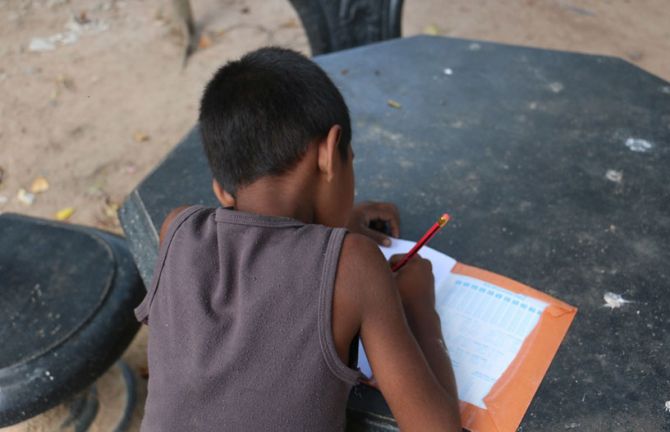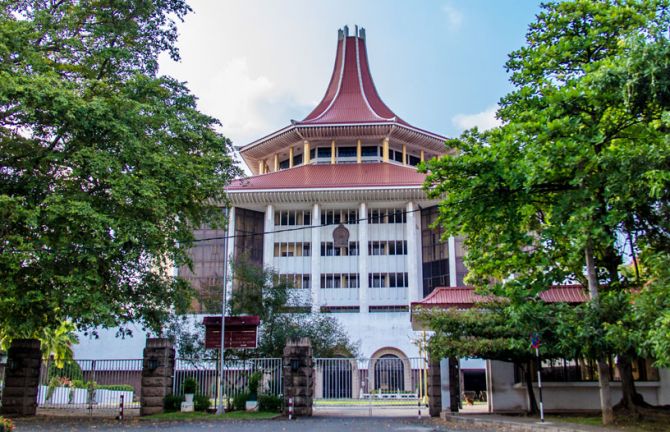


Feature Story
Sri Lanka’s Supreme Court makes landmark decision prohibiting HIV discrimination
02 May 2016
02 May 2016 02 May 2016HIV activists in Sri Lanka are celebrating a landmark decision by the country’s Supreme Court that which prohibits HIV discrimination in education settings.
Princey Mangalika, Executive Director of the Positive Women’s Network in Sri Lanka, said, “I would like to express my appreciation to the Supreme Court. This marks a momentously progressive step forward for the people living with HIV community in Sri Lanka.”
The Supreme Court issued the directive in response to a fundamental rights violation petition filed by Chandani De Soysa in February 2016. Ms De Soysa is from the rural community of Illukhena, Kuliyapitiya, in western Sri Lanka. She was left in difficult circumstances when she lost her husband last September. Ms De Soysa believed strongly that her five-year-old son was entitled to an education and tried to enrol him in the local school. However, the school system denied the boy entry because a rumour was circulating that his father had died of AIDS-related causes and that the boy was HIV-positive.
“I felt dead inside, when my child was not accepted into school, when my own neighbours discriminated against me without any human consideration, I felt lost,” said Ms De Soysa.
Even though it was a violation of her son’s human rights, Ms De Soysa agreed to him taking an HIV test. Although his status was confirmed as negative, the boy was still denied enrolment. Ms De Soysa visited a number of other schools in the area, but they all refused admission.
“It was not an easy decision to make, but I decided that for my child I would fight. I did not want any other parent or child to face such an unbearable situation,” said Ms De Soysa. With support from UNAIDS and the Positive Women’s Network, she filed her petition with the Supreme Court.
The court’s directive, which was released on 28 April, stated that the right to an education of children living with or affected by HIV must be upheld, based on the country’s constitutional directive of universal access to education for children between the ages of 5 and 14 years old.
The Supreme Court also went a step further, reminding the state of its obligation to take necessary measures to protect, promote and respect the human rights of people living with HIV. This is the first court decision in South Asia to make a general pronouncement recognizing the human rights of all people living with HIV and sets a precedent for future cases in Sri Lanka challenging HIV discrimination experienced in settings other than education.
“I would like to give a special note of thanks to all the people out there who offered their support in various forms, from money, food, scholarships, to a simple word of encouragement. I cannot express in words my gratitude for this kindness,” said Ms De Soysa. “My son has a dream to be a doctor one day and I hope he will be an HIV specialist.”
While Ms De Soysa has won the right for her son to attend his local school, she has decided to send her son to a private school, Trinity College in Kandy, which prior to the court’s decision had offered a full scholarship. The school is the alma mater of cricket champion Kumar Sangakkara, who has championed people living with HIV and visited the school to raise awareness of HIV as part of the Think Wise campaign, a joint initiative by UNAIDS, the United Nations Children’s Fund and the International Cricket Council.
“This is a great day for social justice,” said Steve Kraus, Director of the UNAIDS Regional Support Team for Asia and the Pacific. “Sri Lanka’s highest court has stood up in support of people who are being left behind. From now on, no child can be denied access to education based on HIV.”
There have been other cases of children being denied school admission because of their association with HIV, which have been settled through mediation.
HIV-related stigma and discrimination continues to prevent people from accessing key education and health services and reduces employment opportunities. Research conducted by people living with HIV in 13 countries in Asia between 2009 and 2014 found that an average of 12% of HIV-positive people surveyed reported exclusion from social gatherings and activities and 23% said they had been verbally insulted, harassed or threatened.
Sri Lanka’s legal milestone is a big step forward for the rights of people affected by HIV in South Asia. Sindh Province in Pakistan has a comprehensive HIV law, but there is no such protection across the country. India’s courts have ruled to recognize the right to non-discrimination in several specific contexts, including schools; however, a national HIV law has yet to be passed by the parliament.



